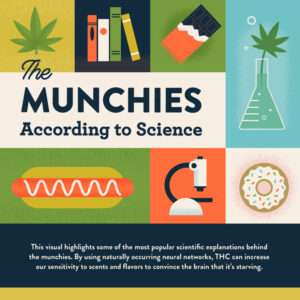One question I frequently hear from people about my cannabis use is how do I reconcile that with my desire for physical fitness. There’s a reason why people associate cannabis use with never ending, unhealthy snacking — because cannabis makes everything taste and smell better. It does trigger a hunger response.
Which is one reason why I won’t keep my favorite lactose free ice cream in the house on the regular.
It’s common knowledge that consuming cannabis can increase your appetite but I didn’t know why. Thanks to the folks over at Marijuana Doctors, now I know and you do too:
Infographic provided by Marijuana Doctors
I’m going to transcribe the information from the image here for the visually impaired:
The Munchies According to Science
This visual highlights some of the most popular scientific explanations behind the munchies. By using naturally occurring neural networks, THC can increase our sensitivity to scents and flavors to convince the brain that it’s starving.
How Cannabis Triggers the Munchies
THe cannabinoid compound tetrahydrocannabinol (THC) binds to and activates cannabinoid type 1 receptors (CB1) in humans and animals to increase appetite.
Below this text is a cartoon cannabis leaf with glasses on, smiling, and standing in front of a chalkboard with the chemical symbol for THC, like a little scientist/teacher.
CB1 Receptors Responsible for Appetite
THC fits into CB1 receptors that are part of the brain and body’s natural endocannabinoid system. They are found across various locations.
Below this text is a diagram of the human body with labels pointing out parts of the body where the natural endocannabinoid system are found.
Forebrain: enhances food palatability (the front, part of your brain where you’d find your forehead)
Basal Ganglia: enhances eating pleasure (found above the ears)
Hypothalamus: regulates appetite and food intake (found just below the basal ganglia slightly behind the ears)
Stomach and Small Intestine: regulates ghrelin, the appetite stimulating hormone (found in the center bottom of the torso)
Solving the THC and Appetite Puzzle
THC Changes the Function of Neurons in Your Brain
THC activates a subset of neurons called proopiomelanocortin neurons (POMCs) in the hypothalamus releasing a chemical: beta-endorphins, which stimulates appetite and cravings.
Neurons that normally play a role in feelings of satiety become the driver of food intake when exposed to THC.
Study conducted by Yale University, lead by Tomas Horvath, professor of neurobiology.
Accompanying image: cartoon cannabis leaf with lines on belly indicating that it’s hungry and/or making noise
THC Makes Foods Smell and Tase BEtter
THC Stimulates the olfactory bulb, which is the part of the brain responsible for recognizing scents.
Mice dosed with THC significantly increased the ability to smell food and eat more of it. Because scent and taste are closely related it likely allows us to better taste flavors.
Study conducted by The University of Bordeaux, lead by Giovanni Marsicano
Accompanying image: cartoon cannabis leaf licking it’s lips and smelling something delicious in the air
THC Promote the Release of Dopamine
THC was found to increase the release of dopamine in the basal ganglia to enhance the sensation of pleasure– that come as a result of eating while high.
When THC is present, your body receives an extra rush of dopamine from the food you’re eating.
Study published in Neuropharmacology, lead by Maria Antoinette De Luca, PhD
Accompanying image: cartoon cannabis leaf munching on some pizza
THC May Actually Stimulate Hunger
THC increases the levels of ghrelin, an appetite-stimulating hormone that speeds digestion.
Ghrelin is also responsible for creating the sensation of hunger that plays a part in metabolizing carbohydrates, which might be why THC causes craving for carbohydrate rich substances.
Study published in Journal of Biological Chemistry, lead by Barts and the London School of Medicine.
Accompanying image: cartoon cannabis leaf looking up lovingly at bread, french fries, and a croissant/all the carbs
Munchies For Medicine
THC appears to convince our brains that we’re starving, which can be especially helpful for weight gains and appetite stimulation in people suffering from a variety of illnesses:
- cancer
- HIV/AIDS– a study published in the journal of Pain and Symptom Management found
- Cachexia or wasting syndrom
97% of HIV patients reported improved appetite with medical cannabis treatment
Accompanying image: a collage with a microscope, cannabis leaf, rx pills, and other little nondescript, but science-y flourishes.
A New Kind of Health Care
Sources: Smithsonian | Examine | Futurism





